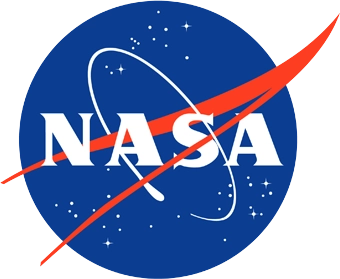Science News
Showing 1 to 24 of 1299.
Steve Platnick Steps Down from NASA After 34 Years of Service
2025.08.20
After more than three decades, at, or associated with, NASA, Dr. Steven "Steve" Platnick has completed his service to NASA Earth Sciences.
Cloud Streets Over the Laptev Sea
2025.07.18
The striking cloud formation developed over Arctic waters north of Siberia in July 2025 as frigid air met warmer open water.
A Haze Over North America
2025.06.03
Canadian wildfires produced smoke plumes so vast they were visible from deep space and caused hazy skies as far south as Florida.
Clouds Hover Over the Alaska Peninsula
2025.04.14
Winds interacted with mountainous terrain to produce long, sharp-edged standing wave clouds.
A Curtain of Dust Over the Tarim Basin
2025.04.05
In a seasonal spectacle, a spring dust storm swept through the dry, barren basin in western China.
A Year in Review: New Earth Discoveries in 2024
2025.03.18
Each year, the Earth Science Division’s Research and Analysis Program combines space, airborne, and ground-based observations with data processing from high-tech computer models and algorithms to uncover new things about the Earth. Explore some of our top discoveries of 2024.
Large Fire Footprint on Faraway Amsterdam Island
2025.02.27
Wildfire burned through unique landscapes and disrupted scientific research on this remote island in the southern Indian Ocean.
A Daily Boost in Dust Height
2025.02.11
Scientists are using the DSCOVR satellite to make more frequent measurements of the height of dust over the Atlantic Ocean.
Net Radiation
2025.01.31
Earth's net radiation, sometimes called net flux, is the balance between incoming and outgoing energy at the top of the atmosphere. It is the total energy that is available to influence the climate.
Annual Science Conference to Highlight NASA Research
2024.12.06
NASA researchers will present findings on Earth science, planetary science, and heliophysics at the upcoming American Geophysical Union (AGU) 2024 annual meeting in Washington, DC, beginning on Monday, Dec. 9.
Alfonso Delgado Bonal Has His Head in the Clouds — for Research
2024.11.26
Research scientist Alfonso Delgado Bonal makes important discoveries about patterns in cloud movements while thriving within the NASA Goddard family.
Charting the Exceptional, Unexpected Heat of 2023 and 2024
2024.11.20
Global temperatures have soared in recent years and climate scientists are trying to understand why.
Typhoons Line Up in the Western Pacific
2024.11.14
Four storms swirled in the basin, many of which set their sights on the storm-ravaged Philippines.
NASA Goddard Hosts Former VP Al Gore to Mark 10 Years of DSCOVR Mission
2024.10.17
Environmentalist and former Vice President Al Gore visited NASA’s Goddard Space Flight Center in Greenbelt, Maryland, on Oct. 16, 2024, to commemorate the upcoming 10th anniversary of the DSCOVR (Deep Space Climate Observatory) mission.
Three Storms Churn in an Active Atlantic
2024.10.06
The active 2024 hurricane season comes to a head with several simultaneous hurricanes—an unusual sight for October.
An Uncommonly Strong Atmospheric River
2024.09.26
A powerful atmospheric river swept through the Gulf of Alaska in September 2024, bringing abundant rain to coastal British Columbia, Canada, and southeastern Alaska.
NOAA Debuts First Imagery from GOES-19
2024.09.18
On Sept. 18, 2024, NOAA shared the first images of the Western Hemisphere from its GOES-19 satellite. The satellite’s Advanced Baseline Imager (ABI) instrument recently captured stunning views of Earth. GOES-19, launched on June 25, 2024. Previously known as GOES-U, the satellite was renamed GOES-19 upon reaching geostationary orbit on July 7, 2024
Smoke Fills South American Skies
2024.09.07
Drought has amplified fire activity across the continent, contributing to exceptionally high carbon emissions in Bolivia and Brazil.
NASA Earth Scientists Take Flight, Set Sail to Verify PACE Satellite Data
2024.09.04
More than 100 scientists will participate in a field campaign involving a research vessel and two aircraft this month to verify the accuracy of data collected by NASA’s new PACE satellite: the Plankton, Aerosol, Cloud, ocean Ecosystem mission.
ARCSIX Analyzes Arctic Sea Ice Loss
2024.08.26
In summer 2024, NASA scientists went to northern Greenland to study how clouds and atmospheric particles may be contributing to the ongoing loss of multiyear sea ice.
NASA Returns to Arctic Studying Summer Sea Ice Melt
2024.07.26
What happens in the Arctic doesn’t stay in the Arctic, and a new NASA mission is helping improve data modeling and increasing our understanding of Earth's rapidly changing climate. Changing ice, ocean, and atmospheric conditions in the northernmost part of Earth have a large impact on the entire planet. That’s because the Arctic region acts ...
NASA, SpaceX Launch NOAA’s Latest Weather Satellite
2024.06.25
NASA successfully launched the fourth and final satellite in a series of advanced weather satellites for NOAA (National Oceanic and Atmospheric Administration) at 5:26 p.m. EDT Tuesday.
NASA Sets Launch Coverage for NOAA Weather Satellite
2024.06.18
NASA will provide live coverage of prelaunch and launch activities for the National Oceanic and Atmospheric Administration’s (NOAA) GOES-U (Geostationary Operational Environmental Satellite U) mission. The two-hour launch window opens at 5:16 p.m. EDT Tuesday, June 25, for the satellite’s launch.
PACE Celebrates National Ocean Month With Colorful Views of the Planet
2024.06.07
What do you give to an ocean that has everything? This year, for National Ocean Month, NASA’s Plankton, Aerosol, Cloud, ocean Ecosystem (PACE) satellite— is gifting us a unique look at our home planet. The visualizations created with data from the satellite, which launched on Feb. 8, are already enhancing the ways that we view our seas and skies.
Showing 1 to 24 of 1299.
